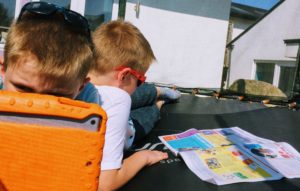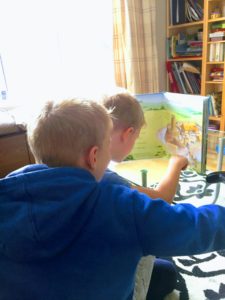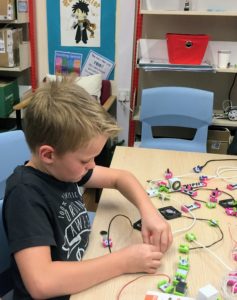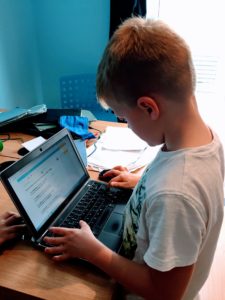From what I hear and read, people of the FIRE community are really keen to not just retire early or become financially independent, but to buy back time. The freedom created when you no longer need to work means you’ve the time to enjoy what makes you happy.
That’s what home education does, in a learning sense. We have the freedom to learn at the beach if it’s a sunny day, or learn out of normal ‘school hours’ if we wish. We can go to museums and galleries when they’re quiet. Home educators can take trips and holidays when they are cheap or travel the world learning as they go. Home educators don’t need to teach formally or record anything, unless they want to. There’s no prescribed curriculum either, so we can follow our sons’ likes and interests.
Learning is incredibly efficient and much more enjoyable. When the Littlest FUs want to know something they often Google it, find answers on YouTube and/or from some of the fantastic learning sites we subscribe to online.
Finding answers to their own questions is learning in its purest form. My boys don’t even see it as learning, and it is more memorable than a typical PowerPoint presentation/worksheet school lesson because it stems from their interests. Sometimes answers are discovered through trial and error. The boys are now skilled in analysing the validity of answers they find from a random Google search – the young gamers of today are well aware of clickbait and know things aren’t always what they claim to be.
Learning often occurs within our everyday lives, too, so for instance, the Littlest FUs learned about ratio and proportion when they wanted to make 30 cupcakes instead of 12 – and there’s the bonus – they did the maths and got to eat cake, too!
Although children learn in a variety of ways, school classes are too big to cater for individual styles of learning, so the current national curriculum has to be very prescriptive and all children can really do is sit in class – listening, watching, or if they’re lucky, doing. Things are often taught in a certain style and format, evidenced at every stage through endless assessments. After the test, there’s no real need to retain the knowledge because it’s time to learn something else, ready for the next test.
We often think of school as a well-oiled machine, but attending school is not a very efficient way to learn.
Time spent on formal learning in school is not the six-hours-a-day, five-days-a-week structure we imagine it to be. There’s a very interesting article by another (ex-teacher) home education mum which outlines how much of the school day is ‘wasted.’ After reading it (and having been a teacher myself) I realised how true it is.
But even if all the ‘wasted’ time in school was tidied up and translated into formal learning, would our children come out of education better educated?
That depends on your take on the curriculum.
When I started to home educate my children my initial plan was to cherry pick all the best bits of the curriculum.
I quickly realised that much of the curriculum is not really worth learning, and my ideas on the best way to home educate are still evolving. We currently follow a semi-structured approach, with basic skills like English and Maths still covered quite formally, and everything else more ad hoc.
The UK curriculum hasn’t changed much at all in years, and much of the things learned are never actually used in real life. The novels studied for English GCSE are largely the same as the ones I read for my O-level in 1987, and when my 12-year-old asked for maths help on linear equations I had to look up how to do it (on the internet). Having not used linear equations in thirty years I’d forgotten it.
So why are these things still on the curriculum? Quitting Teaching makes an interesting observation in his post – ‘the wage slavery of the masses is rooted in our schools’ – is the current system truly thinking ahead to what jobs and life will be like 20 years hence or just a factory producing overspending taxpayers?
In 2013 a study by the University of Oxford predicted that 47% of all current jobs could be automated within 20 years, but coding in primary schools only became part of the curriculum in 2014, which is probably too little too late. Similarly, financial education didn’t become part of the curriculum until the same year. Financially Mint points out that despite this addition there’s still a lack of quality financial education in schools in her post here.
A national curriculum can’t evolve fast enough to keep up with the technological advancements and financial changes the country is going to experience in the next decade or two. So whilst the curriculum aims to ‘prepare pupils at the school for the opportunities, responsibilities and experiences of later life’ I’m not convinced the next generation of adults will be suitably equipped for life by learning what subordinate clauses and fronted adverbials are when they are in primary school. (Bizarrely these terms don’t even appear in high school curriculums!)
If today’s youngsters find themselves underqualified for their chosen job they will have to seek further training, probably via e-learning. They will naturally turn to the internet for information just as they did throughout their childhood (and there will also be practical reasons for the e-learning option, such as avoiding student debt.) But how disheartening for these youngsters to have spent 14 years in fulltime education and still not have the skills they need to succeed in the world… What a terrible waste of everyone’s time!
So even though our boys are only 9, I’m currently researching online programmes and material (preferably free) that are age/ability appropriate that are interesting for them and potentially useful to their future selves – whether that’s by developing problem-solving skills, sparking an interest in coding, or learning potential leadership skills.
I’m going to post some of my findings on here in case anyone in the FIRE communities can make use of them for their own children or themselves.
I’d love to hear your views on my post. How do you see education today? Are we preparing our youngsters for life? Are schools just glorified childcare so their parents can go out to work? What is stopping you home educating your child?






Thanks for the reference! Certainly pursuing FIRE as an adult is breaking the mould. We have been dealt a life of wage slavery and are trying to escape it. I am stuck with my lot (for now) but I certainly don’t want this life for my kids. What you are trying to do is admirable and you re certainly breaking the mould which takes a lot of guts, especially when the future of your most creation in your life is “at risk”, or so friends and family will say. So well done, just think of all the thing’s your boys can learn outside a rigourously academic framework : Gardening, joinery, painting, mechanics, investing, accounting, bricklaying, proper home economics like sewing and cleaning, entrepreneurship, cooking, music, and their daily PE lesson can be a bike ride or a run. I imagine it is very liberating.
I know most of these are also provided in schools but cooking lessons these days are bacon butties and pizza.
What do you think the pros and cons ae from a social perspective?
Maybe if you lived in a very isolated rural setting you might struggle to meet up with other home ed children, but you’d probably struggle to meet up with anyone socially in that case! We’ve found it really easy to cover the socialisation aspect. Apart from the fact that the boys have older brothers and a sister (who definitely keep them grounded as well as entertained!) they still see their old school friends almost every day. They’ve made loads of home ed friends, too – I’ve found there aren’t enough hours in the week to participate in all the fun things going on locally for home educated children. Our boys regularly go to forest school, yoga, trampolining lessons and sports classes and we’ve been on ‘school’ trips to castles, museums, the zoo, coding classes at the Apple Store (!) and science lectures at the local university with HE friends of all ages. Then there’s online socialisation – playing games like Roblox and Fortnite online with their pals. Every week there are more and more children joining local groups and it’s a mix of ages, too – from tots to teens so socialisation goes on at all levels.
It’s been quite an eye-opener, our HE adventure so far. I wish I’d discovered it sooner!